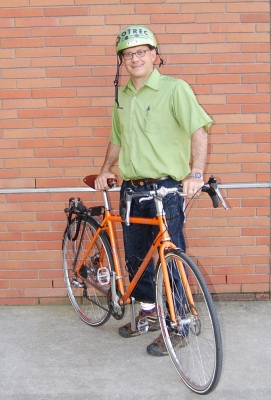Metro grant will assist OTREC researcher in evaluating the use of e-bikes

OTREC research associate John MacArthur, in partnership with Drive Oregon, has been awarded a grant from Metro.
The grant is part of a $2.1 million effort by Metro to improve air quality and community health.
With the Metro grant, Drive Oregon and MacArthur plan to conduct a study of consumer perception and use of electric bicycles, pedal-bikes that provide extra propulsion from a rechargeable battery.
The idea is to see whether having the use of an e-bike will persuade non-bicycle-commuters to use a bike for the “first and last mile” of their daily commute; for example, to get from their workplace to the nearest MAX light rail station.
The e-bikes provided in the study will be foldable for convenient carrying onto the train. Ultimately, the partners of this study hope to increase the percentage of people who commute by bicycle and light rail, thus contributing to overall community health by reducing automobile emissions.
30 e-bikes will be loaned to 180 employees of Kaiser Permanente, at three designated work locations. Each participant will have the free use of an e-bike for one month, bookended by surveys about their expectations and perceptions of the experience.
MacArthur is conducting some overlapping research into e-bike use in a related OTREC project, “Evaluation of Electric Bike Use in Portland Metro Region.” This research explores the potential new market segments for e-bikes and the economic, operational, safety, and transportation issues surrounding the use of this alternative bicycle.
Drive Oregon’s mission is to promote, support, and grow the electric vehicle industry in Oregon. As part of this mission they try to keep people informed about electric vehicle alternatives. Metro, the elected regional government for the Portland metropolitan area, has an ongoing commitment to providing clean air, clean water, and good transportation choices for residents of Multnomah, Washington, and Clackamas counties.
Currently there is a relatively high perentage of bicycle commuters, compared to drivers, in the Portland area. According to MacArthur, there has been some discussion among bicycle proponents as to whether that percentage has reached a plateau.
Certain demographics, including senior citizens and those with physical disabilities, might help “fill in the gap” of the bicycle mode share, if they considered the use of e-bikes a viable alternative to cars. Similarly, people who are physically able to ride a bicycle comfortably for short distances may shy away from commuting to work on a daily basis, if their commute is a longer distance than they feel able to tackle. The extra boost of battery-powered assistance may help convince these reluctant commuters to take the final step, and go by bike.
